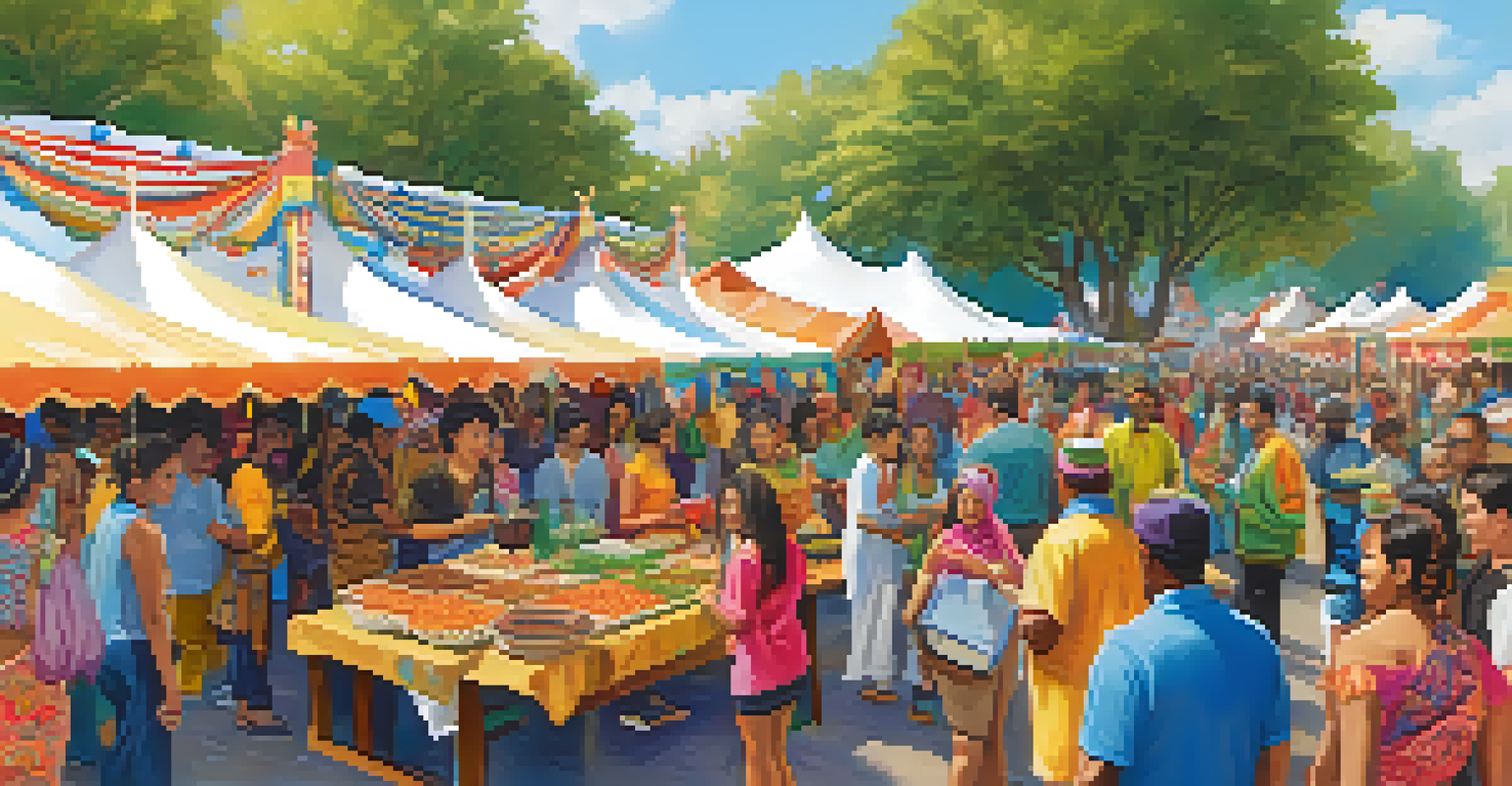The Impact of Community Beliefs on Personal Spiritual Journeys

Understanding Community Beliefs and Their Nature
Community beliefs are the shared values and ideas held by a group, often shaped by culture, history, and experiences. These beliefs can be deeply ingrained and serve as a framework for understanding the world. They encompass everything from religious practices to ethical standards and influence how individuals perceive their roles within a community.
Community is much more than belonging to something; it’s about doing something together that makes belonging matter.
For instance, in a close-knit religious community, the congregation's teachings often dictate not just spiritual practices but also social behaviors and moral decisions. Such environments provide a sense of belonging, which can significantly impact an individual's spiritual journey. When individuals align their personal beliefs with those of their community, it creates a reinforcing cycle of faith and belonging.
However, it's essential to recognize that not all community beliefs resonate with every individual. Some may feel a disconnect, prompting them to explore their spirituality outside of communal frameworks. This dynamic illustrates the intricate relationship between community influence and personal beliefs.
The Role of Tradition in Shaping Spiritual Journeys
Tradition plays a pivotal role in shaping community beliefs and, consequently, personal spiritual journeys. Many communities pass down practices and rituals through generations, creating a rich tapestry of shared experiences. These traditions provide a foundation for individuals to explore their spirituality within a familiar context, often offering comfort and guidance.

Take, for example, a family that gathers every Sunday for a spiritual service. This ritual not only reinforces their collective beliefs but also instills a sense of routine and security in younger members. As they grow, these traditions may either become a cherished part of their identity or be questioned and reshaped to fit their evolving beliefs.
Community Beliefs Shape Identity
Shared values within a community influence individual identities and spiritual journeys.
In this way, tradition serves as both a stabilizing force and a potential catalyst for personal exploration. While some individuals may embrace these traditions wholeheartedly, others might find themselves at a crossroads, seeking to reconcile personal beliefs with inherited practices.
How Shared Values Foster Connection and Growth
Shared values within a community can create a powerful bond among its members, fostering an environment conducive to spiritual growth. When individuals connect over common beliefs, it nurtures a sense of unity and support. This shared understanding can empower individuals to explore deeper aspects of their spirituality, knowing they have a supportive network.
Tradition is not the worship of ashes, but the preservation of fire.
For example, a group dedicated to environmental stewardship may inspire its members to reflect on their spiritual connection to nature. This shared mission not only strengthens their community ties but also encourages personal growth as individuals begin to align their actions with their values. The impact of this interconnectedness can be profound, leading to collective spiritual awakening.
However, it’s important to acknowledge that this connection can also present challenges. Individuals may feel pressured to conform to community expectations, which can hinder authentic personal exploration. Striking a balance between communal belonging and individual authenticity is crucial for holistic spiritual development.
Navigating Conflicts Between Personal and Community Beliefs
At times, individuals may find themselves at odds with the beliefs of their community, leading to internal conflict. This tension can arise when personal experiences or insights challenge collective norms. Such situations often prompt a reevaluation of one’s beliefs and may even lead to a spiritual crisis.
Consider someone raised in a traditional religious setting who begins to question certain teachings after exploring diverse perspectives. This journey of questioning can be both enlightening and isolating, as the individual navigates the discomfort of differing beliefs. Conversations with others who have experienced similar conflicts can provide valuable support during this tumultuous time.
Tradition Balances Belief and Growth
Tradition provides a foundation for spiritual exploration while also allowing for personal evolution.
Ultimately, these conflicts can serve as catalysts for growth. They push individuals to delve deeper into their spirituality, seeking out authentic beliefs that resonate with their unique experiences. Embracing this process can lead to a richer, more nuanced understanding of spirituality that honors both personal and communal influences.
The Influence of Community Support on Spiritual Practices
Community support can significantly enhance an individual’s spiritual practices, providing encouragement and accountability. When surrounded by like-minded individuals, people often feel more motivated to engage in their spiritual journeys. This collective energy can create a vibrant atmosphere where personal and communal growth flourish.
For instance, a meditation group can offer a sense of shared purpose, making individual practices feel less solitary. Members often share experiences, insights, and techniques that enrich each other's journeys. This communal aspect can transform what might be a solitary activity into a deeply connected experience.
However, it’s also crucial for individuals to cultivate their unique practices, ensuring they align with their personal beliefs. Finding the right balance between community involvement and personal exploration can lead to a more fulfilling spiritual experience.
Adapting Spiritual Journeys in Diverse Communities
Diverse communities bring a wealth of perspectives and practices that can enrich personal spiritual journeys. Exposure to different beliefs can challenge individuals to expand their understanding of spirituality and redefine what it means to them personally. It encourages an open-minded approach, fostering curiosity and exploration.
For example, someone in a multicultural neighborhood may encounter various spiritual traditions, from Buddhism to Indigenous practices. Engaging with these different beliefs can inspire a deeper inquiry into their spirituality, allowing for a more holistic view of the world. This cross-pollination of ideas can spark new insights and practices.
Diversity Enriches Spiritual Exploration
Engaging with diverse beliefs encourages individuals to broaden their understanding of spirituality.
Nevertheless, navigating such diversity also requires sensitivity and respect. Individuals must approach these interactions with an open heart, ready to learn while also honoring their unique beliefs. This balance is key to creating a spiritually enriching environment that celebrates both diversity and individuality.
Embracing Change: The Evolution of Personal Beliefs
As individuals journey through life, their beliefs may evolve in response to personal experiences and community influences. This evolution is a natural part of spiritual growth, reflecting the dynamic nature of belief systems. Embracing change allows individuals to adapt and refine their understanding of spirituality, keeping it relevant to their lives.
For instance, someone who once adhered strictly to their community's beliefs may find themselves drawn to new philosophies as they encounter different life experiences. This transformation can be both exciting and daunting, as it often involves letting go of long-held beliefs. However, this process is essential for authentic spiritual development.

Ultimately, this journey of evolution highlights the importance of self-reflection and openness. By examining how community beliefs have shaped their spirituality, individuals can make conscious choices about which beliefs to embrace or challenge, ensuring a fulfilling and personal spiritual journey.